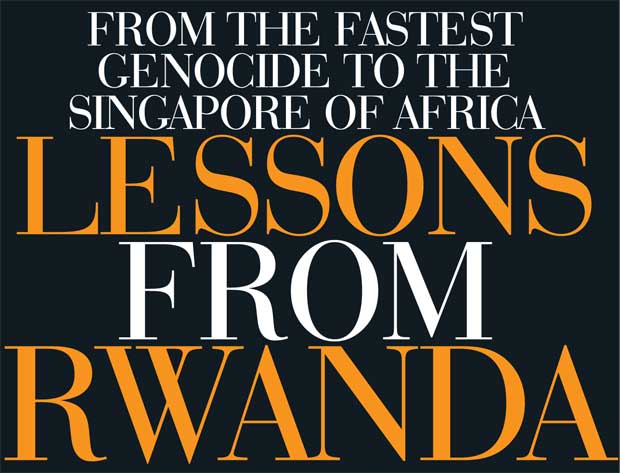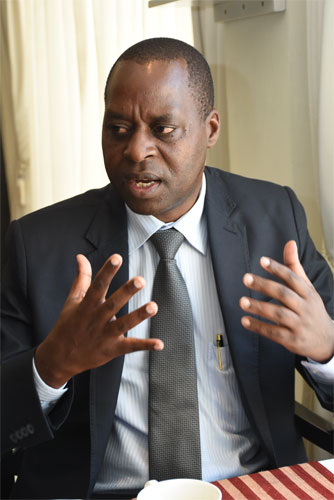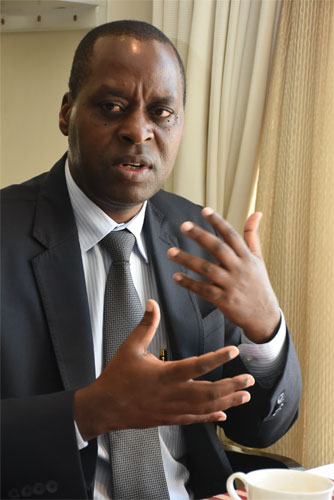Reply To:
Name - Reply Comment
Last Updated : 2024-04-27 00:40:00

It is a vibrant and fast growing relationship. Over the last few years, there has been an increased exchange in trade, education and the sharing of water management and irrigation skills. We have conducted trade activities with the Ceylon Chamber of Commerce, exchange programmes, and Sri Lanka also has an Honorary Consul. Quite a number of MOUs are now being signed in relation to defence and broader education and technology exchange such as the mining, cutting and polishing of gems. We need to learn these technologies that Sri Lanka is skilled in. Rwanda has a friendly business environment and is open to Sri Lanka to invest and partner with. We can see some of the big Sri Lankan companies establishing their businesses in Rwanda. 
Rwanda is growing but we have a big skills gap so we are open to Sri Lankans who want to explore opportunities and bring skills to help our growth. We have also just joined the Commonwealth and with countries like India, Bangladesh and Sri Lanka also part of it we are looking at areas such as trade, business, investment, education and health. We have been building upon these with Sri Lanka for a while and we can boast of a healthy partnership in the education sector with 32 Rwandan students studying in Sri Lanka. Sri Lanka is growing very strongly and as such there is much collaboration in the tea sector as well. There is a lot that can be done as I have seen in the last three and a half years.
 In the period right after the 1990s genocide, countries such as the US and the UK were heavily involved in helping Rwanda rebuild itself and recover. With such close links to major powers, does Rwanda have an independent foreign policy or does it reflect the interests of these countries?
In the period right after the 1990s genocide, countries such as the US and the UK were heavily involved in helping Rwanda rebuild itself and recover. With such close links to major powers, does Rwanda have an independent foreign policy or does it reflect the interests of these countries? Our foreign policy is influenced by experience we went through which was one of conflict and genocide. For us post-genocide reconciliation centred around opening up the country to the global community since part of the challenge we faced was being closed and inward looking. Therefore we decided to open and link up with other countries in order to be an active member in the international community. This is the reason why we joined the East African Community and then eventually the Commonwealth. In addition we reached out to other countries that we saw a mutual interest in, in the areas of tourism, trade, investment, and business. This has been a major driving factor in our post genocide policy.
Yes, we have good relationships with the UK and the USA but we also receive benefits from our links with countries like Sri Lanka so it is all about opening up the country.
It is because it is crucial for development. We started about a decade ago by rolling out fibre optic cables for high speed internet. Many of our economic partners did not approve of this move as a solution for a poor country and advised that we should use these resources for social protection and health. But we firmly believed that IT works for the poor and IT works for better delivery of health, education and social protection and the investment was necessary to build it into to an economic and social hub in the region. Now everyone understands the benefits. Everyone has access to 4G internet. Costs have come down and it delivers essential services to citizens. We can deliver education and the quality of education improves. We have a ‘one laptop per child’ plan for this. IT is used to deliver healthcare by connecting villages with mobile phones so that they can call health services. This has a high impact in reducing child and maternal mortality. It also helped in the roll out of phones in the country and for people to access bank accounts. We are also a tourist country. People want to be connected and when people visit our country due to the access to connectivity they stay longer.
We had the realization that women are half of the population so we can’t leave one half out. One strategy was to increase the participation of women in decision making. This was achieved through constitutional reform which involved quotas. This increased the quota of women in parliament; they now make up 64% of parliament. This has translated into judiciary, the Cabinet and local levels as well. This also involves the rolling out of education. Sri Lanka has done very well with free education since this offers opportunity to both genders without having to pay. Each society is unique and can be inspired but gender empowerment is very important.
These are merely allegations and have no basis for them at all. We are looking at internal security and our own growth agenda. This is the preoccupation for us and and we have no issues with our neighbours. The region we find ourselves in is challenging since it is prone to conflict. Therefore our approach is that they should be addressed internally if they don’t affect Rwanda. We have had challenges because of our history and remnants of genocide forces were roaming in from DRC but we worked with DRC to address that and to contain and minimise the problem. The country is stable now. We remain vigilant to secure borders and internal cohesion but we don’t interfere in other’s politics. We are all members of the East African community and we are working towards regional integration.
This is a point of concern. The region should be stable because if one part is not it has an impact on the other. We have to deal with many refugees from Burundi and we have had to divert resources to resettle them, for the education of their children and for shelter and water. This is because we have been refugees ourselves so we make sure they are received well. This is a point of concern as it is a drain on the economy. Why I said it was internal was because the problem is internal in the governing dispute Burundi has. Our wish is that Burundi solves their problems quickly.
Rwanda went through a devastating genocide. What we have done over the last few years was to rebuild our country to benefit all Rwandans. We had a huge refugee crisis so we have had to focus on returning and reintegrating refugees. We worked on reconciliation to work out a peaceful process of life for our people to overcome the torment of their past. We had to build institutions for democracy. We have a new constitution guaranteeing rights and the per capita income has almost doubled.
Allegations for a country in post conflict with an opposition abroad is not a new story to us. But it contradicts the reality of the country. It is a peaceful country that benefits every Rwandan. It is highly rated in governing reforms hence donors pour money into the country. They do this since we respect human rights, have democracy and have good governance. We have the least instances of corruption and have zero tolerance for pollution. For a small economy like ours to attract investment of the nature we do details of the positive story of Rwanda.
 Once again like Sri Lanka saw in 2015, the President of Rwanda has implemented constitutional changes, albeit through a referendum, that effectively allow him to stay in power till 2034 by running for a third term. Allies such as the US have asked him to step down to “foster a new generation of leaders.” President Kagame has said however that Rwanda did not need an eternal leader. How do these two facts coexist?
Once again like Sri Lanka saw in 2015, the President of Rwanda has implemented constitutional changes, albeit through a referendum, that effectively allow him to stay in power till 2034 by running for a third term. Allies such as the US have asked him to step down to “foster a new generation of leaders.” President Kagame has said however that Rwanda did not need an eternal leader. How do these two facts coexist? I don’t know where 2034 comes from because there is no intention like that. The new constitution that has been adopted guarantees time limits. The reason for this change was not by the president at all but because a majority of Rwandans felt that this was the first time we had a leader who had a very clear vision where the country had to go. Rwanda is at a point where people feel that there is much more that can be done over the years and they want the pending programmes to be executed. So until they have total confidence that a new leader can come in and not take the country down the drain they want President Kagame. They demanded constitutional change and time limits would be maintained but there is a transitional period to maintain the current pace of development. The people did not want a sudden change as we have seen sudden changes retarding the development in neighbouring countries. This shows the maturity of the judgement of the people where you are not going to gamble with the future of a country by all of a sudden changing things. This had unanimous support and this was done democratically which involved a big debate around the country.
It all started with leadership. The President in 2000 started with a brave vision and a timeline of 2020 to make Rwanda a mid-income country. We invested heavily in infrastructure, health, education, and IT and his plan was laid down very concretely. This gave us a clear sense of how public investment should be made. He also laid down the reforms for the country to be conducive for foreign investment. Poverty has reduced and overall productivity of the country has risen. This is all because of a clear vision which was rigorously pursued. Another important aspect was the fight against corruption. Corruption drains the country so that public resources are not used properly. This ensured confidence to foreigners. This has also helped us.
For us reconciliation was very essential. It was an existential matter for us since Rwandans killed fellow Rwandans and they were neighbours and would continue to live together. We can’t build a country like that without bridging the gap. One idea to solve this was was Gacaca which was the communal way of justice through dialogue truth and punishment and forgiveness. We could do this based on the history of the country and traditional practices. This worked for us since it was built from a traditional model.
Sri Lanka has a very long history and each society is unique in its own way. Therefore we could only get inspiration from one another. The South African Reconciliation Commission could not be used for Rwanda due to the differences. Within Sri Lanka, there are some values and traditions that should inspire the country. Sri Lanka has done very well in the immediate aftermath and to be where you are right now, and it is incredible so see the growth and the will of the people. We are very impressed with what the country has achieved and I see the future is very bright.

Add comment
Comments will be edited (grammar, spelling and slang) and authorized at the discretion of Daily Mirror online. The website also has the right not to publish selected comments.
Reply To:
Name - Reply Comment
US authorities are currently reviewing the manifest of every cargo aboard MV
On March 26, a couple arriving from Thailand was arrested with 88 live animal
According to villagers from Naula-Moragolla out of 105 families 80 can afford
Is the situation in Sri Lanka so grim that locals harbour hope that they coul